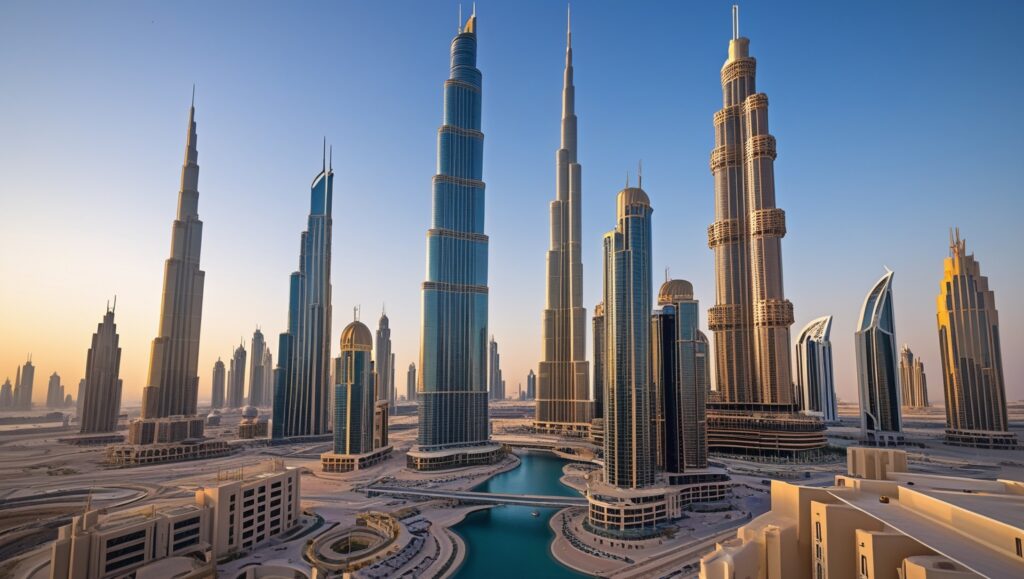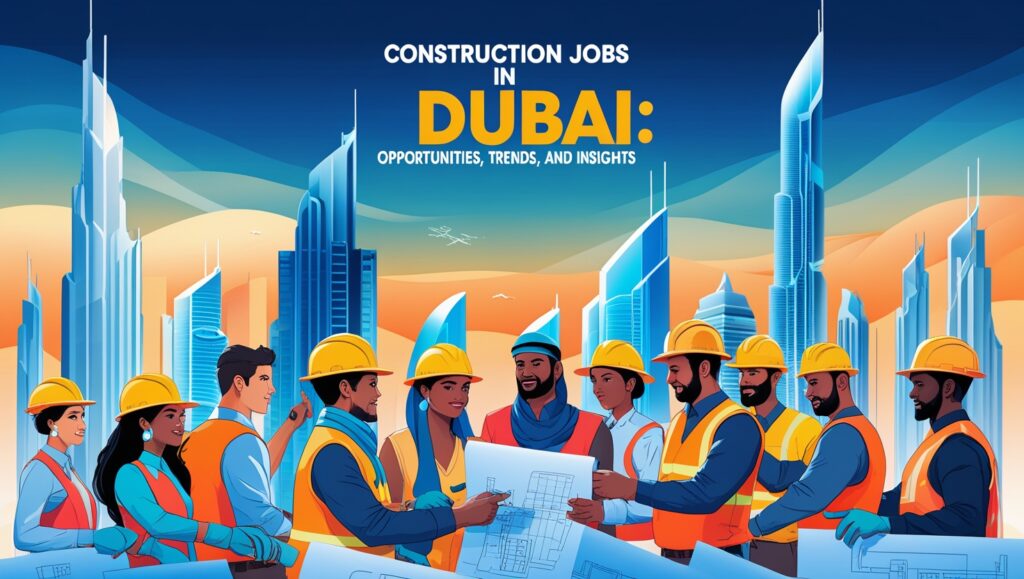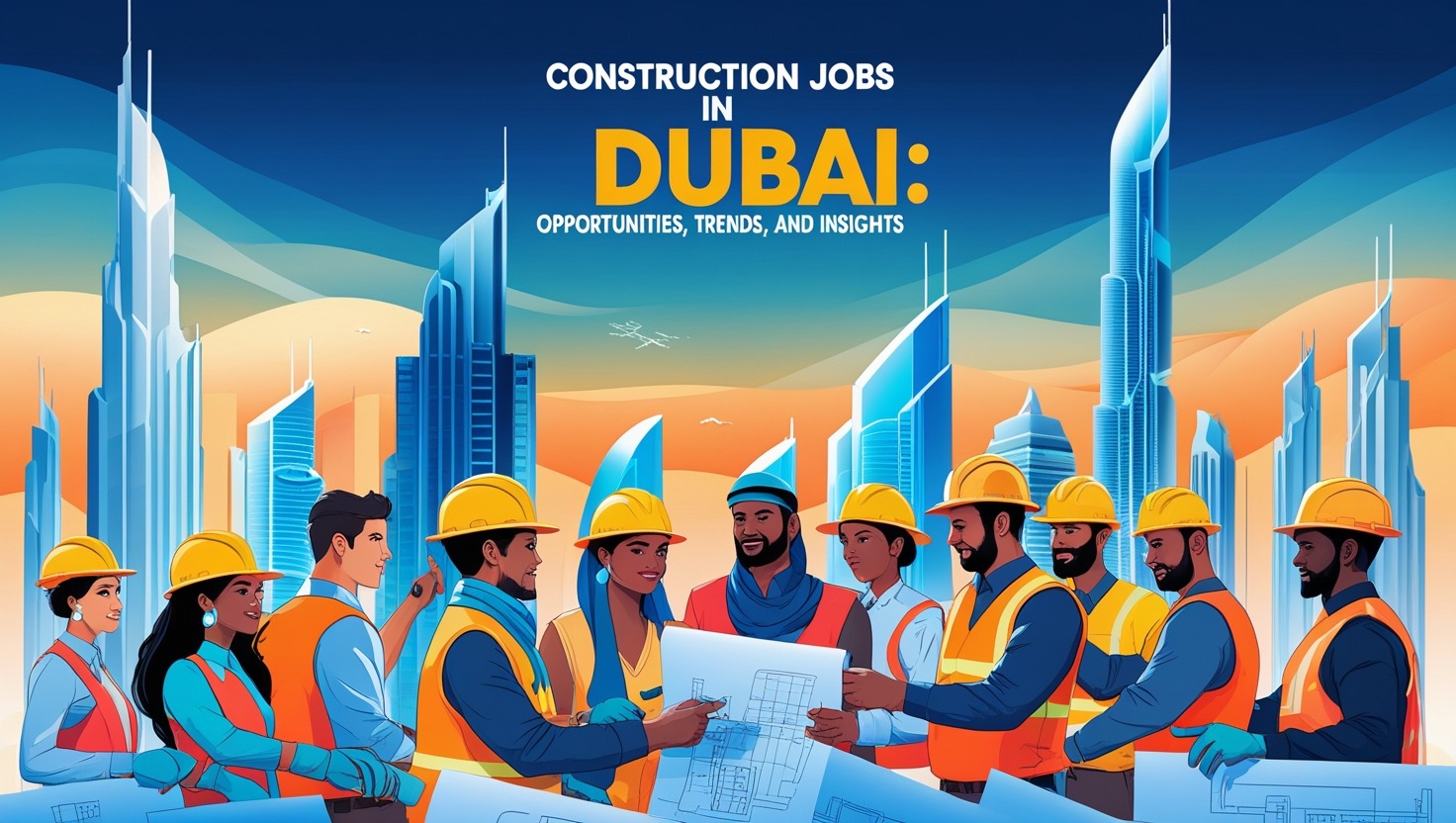
Dubai, the jewel of the United Arab Emirates, has long been known for its towering skyscrapers, ambitious infrastructure projects, and luxurious real estate. The city is a global hub for construction and development, offering numerous job opportunities in the construction industry. For anyone looking to work in Dubai’s construction sector, it’s essential to understand the current trends, the skills required, and how to navigate the competitive job market.
In this article, we’ll explore the growing demand for construction jobs in Dubai, the key skills and qualifications you need, and provide insights into the various opportunities available in the industry. We will also share personal anecdotes to make this article relatable and engaging, and provide tips on how to stand out when applying for a job in Dubai’s fast-paced construction industry.
Why is the Construction Industry in Dubai Booming?
Dubai has become a symbol of architectural innovation and engineering prowess. From the world’s tallest building, the Burj Khalifa, to the man-made Palm Islands, Dubai’s skyline is a testament to the city’s ambition and forward-thinking vision. The construction industry has been at the heart of this development, and it continues to expand.
Dubai’s construction boom is fueled by several factors, including:
- Mega Infrastructure Projects: The city is constantly developing new projects, including highways, residential buildings, hotels, and shopping malls. Major projects like the Expo 2020 (now delayed to 2021-2022) and the expansion of Dubai International Airport have created a steady demand for construction workers.
- Real Estate Growth: Dubai’s real estate sector is always on the rise, with continuous demand for luxury apartments, hotels, villas, and commercial properties. This creates ample job opportunities for construction professionals.
- Government Investment: The UAE government heavily invests in public infrastructure, such as roads, public transportation, and renewable energy projects. The Dubai Metro and the upcoming Etihad Rail project are prime examples of government-led construction initiatives.
- International Appeal: With an attractive tax-free environment and a strong economy, Dubai has become a magnet for expatriates from around the world. Many of them work in the construction sector, further boosting the demand for skilled labor.
Types of Construction Jobs in Dubai

The construction sector in Dubai is diverse, offering a wide range of job opportunities across different areas. Here are some of the most common construction jobs in Dubai:
1. Project Manager
A Project Manager is responsible for overseeing the entire construction project from start to finish. They manage budgets, timelines, and ensure that all work is completed to the required standards. Project managers often work closely with engineers, architects, and contractors to coordinate the work.
Skills Needed:
- Strong leadership and management skills
- Knowledge of project management software
- In-depth understanding of construction processes and materials
2. Civil Engineer
Civil engineers design, build, and maintain infrastructure projects such as roads, bridges, and buildings. In Dubai, civil engineers are often involved in large-scale development projects like skyscrapers or urban expansion.
Skills Needed:
- Degree in Civil Engineering or related field
- Proficiency in CAD software
- Strong problem-solving skills
3. Construction Laborer
Construction laborers are the backbone of any construction project. They handle physical tasks such as digging, lifting, and moving materials. In Dubai, there is a constant demand for skilled laborers who can perform specific tasks like welding, masonry, and carpentry.
Skills Needed:
- Physical strength and endurance
- Specific trade skills (carpentry, plumbing, etc.)
- Health and safety knowledge
4. Architect
Architects design the layouts of buildings and structures, taking into consideration aesthetics, functionality, and safety. Dubai’s architectural landscape is iconic, with innovative designs that challenge traditional building norms.
Skills Needed:
- Degree in Architecture
- Knowledge of architectural design software
- Creativity and attention to detail
5. Quantity Surveyor
Quantity Surveyors manage costs, budgets, and resources for construction projects. They calculate the quantities of materials required, prepare cost estimates, and negotiate with suppliers and contractors.
Skills Needed:
- Strong mathematical and analytical skills
- Degree in Quantity Surveying or related field
- Experience in cost estimation and contract management
6. Electrical and Mechanical Engineers
Electrical and mechanical engineers play a crucial role in ensuring that the electrical and mechanical systems of buildings are functioning properly. They are involved in everything from power distribution to air conditioning and plumbing systems.
Skills Needed:
- Degree in Electrical or Mechanical Engineering
- Knowledge of building systems
- Troubleshooting and problem-solving skills
7. Safety Officers
Safety officers ensure that all construction sites comply with health and safety regulations. They are responsible for inspecting work sites, identifying potential hazards, and ensuring workers are following proper safety protocols.
Skills Needed:
- Knowledge of health and safety regulations
- Strong communication and observational skills
- Certification in Occupational Health and Safety
Skills and Qualifications Required for Construction Jobs in Dubai
To work in Dubai’s construction sector, candidates must meet certain educational and professional qualifications. Below are the key skills and certifications that can enhance your chances of securing a job in the industry:
- Education: A degree in engineering, architecture, or construction management is often required for technical roles such as project managers, engineers, and architects. Many positions also require professional certifications specific to the construction industry.
- Experience: Dubai’s construction sector is highly competitive, and candidates with prior experience in large-scale projects or multinational companies are often preferred. Hands-on experience, whether in a managerial or labor role, is highly valued.
- Certifications: Certifications in safety management (such as NEBOSH or OSHA) and project management (such as PMP) are beneficial for many roles in the construction industry. These certifications demonstrate a commitment to safety and quality, which are highly regarded in Dubai’s construction sector.
- Technical Skills: Proficiency in industry-standard software, such as AutoCAD, Revit, or Primavera, is crucial for engineers, architects, and quantity surveyors. Understanding construction materials and building techniques is also important.
- Soft Skills: Strong communication, teamwork, and leadership skills are essential. Construction jobs often require collaboration with diverse teams, so interpersonal skills are key.
Personal Anecdote: My Experience with Dubai’s Construction Sector

I once had the opportunity to work with a construction firm in Dubai as a project coordinator. The excitement of being involved in projects like high-rise towers and luxury resorts was unmatched. The first thing that struck me was the pace at which things moved. A project that would take years in my home country was completed in just months.
However, the competition was fierce, and standing out in the job market was challenging. I quickly learned the importance of building a strong network. In Dubai’s construction industry, personal connections often play a significant role in securing job opportunities. I also realized that staying updated with the latest construction trends, technologies, and safety regulations was essential for career growth.
How to Apply for Construction Jobs in Dubai
- Job Portals: Websites like Bayt, Monster Gulf, and LinkedIn are great places to search for construction jobs in Dubai. Many companies post job openings on these platforms, and it’s an excellent way to apply directly.
- Recruitment Agencies: Many recruitment agencies specialize in placing workers in Dubai’s construction sector. Registering with these agencies can help streamline your job search.
- Networking: As mentioned, networking plays a crucial role in the Dubai job market. Attend construction-related events, exhibitions, and workshops, where you can meet industry professionals.
- Visa and Work Permit: To work in Dubai, you will need a valid visa and work permit. Most employers will handle the visa process once you have secured a job offer.
Conclusion
Construction jobs in Dubai offer exciting opportunities for professionals from all over the world. The city’s constant development and innovation in the construction sector provide a dynamic and growing job market. Whether you’re an engineer, architect, project manager, or skilled laborer, Dubai has a place for you in its booming construction industry. By understanding the trends, acquiring the right skills, and building connections, you can make the most of the opportunities available and build a successful career in Dubai’s construction sector.
